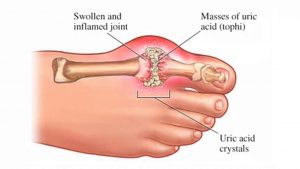Primary Progressive Aphasia – A Mothers Struggles
April 6, 2016Preventing Slip and Fall Injuries
June 7, 2016If you, or anyone you know has ever suffered from Gout, you understand the fact that it can be a very painful condition. Let’s talk about the health condition called Gout.

One of the most painful types of arthritis is called Gout. It is caused when the body has an over accumulation of uric acid. This can then lead to:
- Sharp uric acid crystal deposits in joints, often in the big toe
- Deposits of uric acid (called tophi) that look like lumps under the skin
- Kidney stones from uric acid crystals in the kidneys.
The Signs and Symptoms of Gout
Gout can affect a variety of joints, however, the great toe is a joint that is commonly involved.
There are signs and symptoms with Gout which include pain, redness, swelling, stiffness and warmth in the affected joint(s).
The Cause of Gout
Uric acid is normally in the body and is created from the breakdown of ‘purines’. Purines are found in the tissues of your body and are also found is certain foods, such as sardines, anchovies, liver, kidney and some other foods.
If for some reason, a person’s body does not remove enough uric acid and it begins to build up in your system, Gout can occur.
Contributing Factors of Gout
Certain individuals are at greater risk of acquiring Gout. You have increased risk if you:
- Have family members with the disease
- Are a man
- Are overweight
- Drink too much alcohol
- Eat too many foods rich in purines
- Have an enzyme defect that makes it hard for the body to break down purines
- Are exposed to lead in the environment
- Have had an organ transplant
- Use some medicines such as diuretics, aspirin, cyclosporine, or levodopa
- Take the vitamin niacin.
Treatment of Gout
If you are diagnosed with Gout, your doctor may prescribe you with a medication to control the pain and inflammation. Attacks can last from days to weeks (or even months).
It is best to discuss your treatment options with your healthcare provider.
Gout is an arthritic condition that can be very painful and debilitating for those who suffer from it. However, there are things that you can do to reduce the attacks that occur. This means working with your doctor with any necessary medications, eating the right foods that are low in purines, decreasing alcohol consumption, and maintaining an overall healthy lifestyle.
For more information, visit NIH

